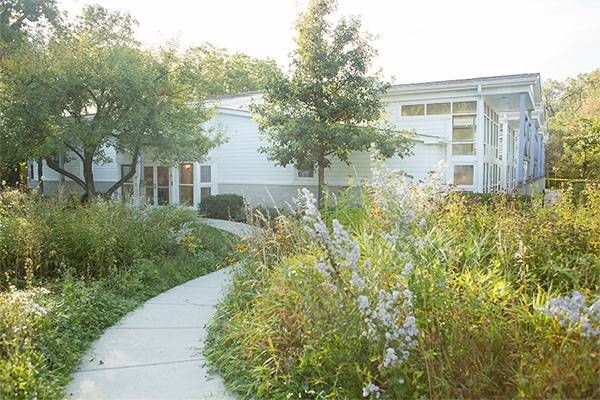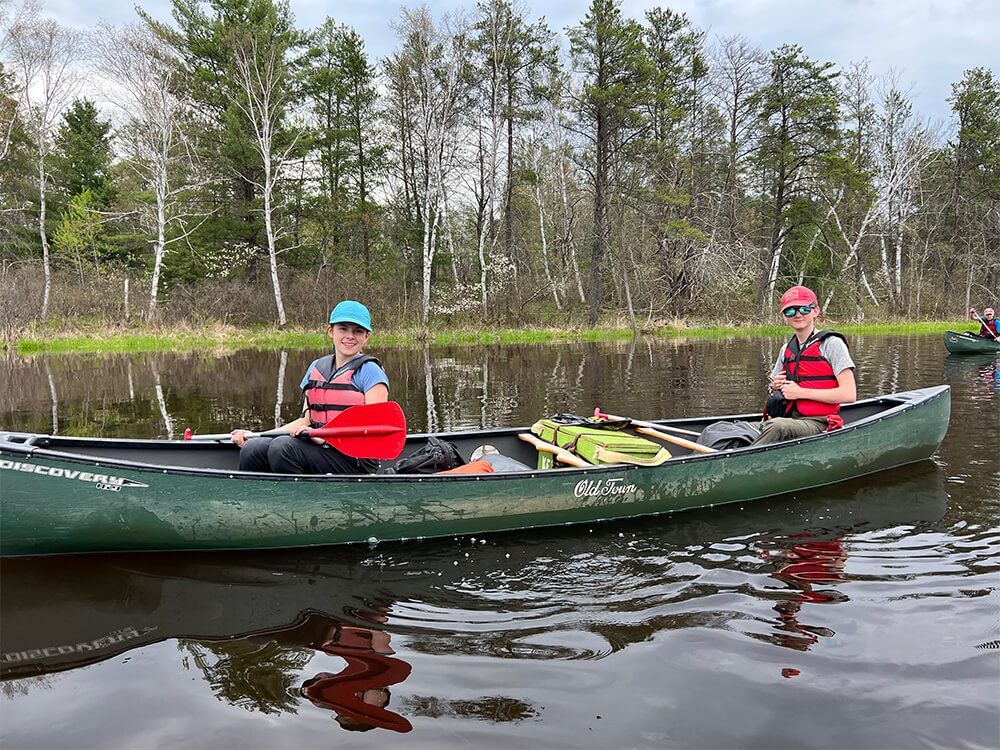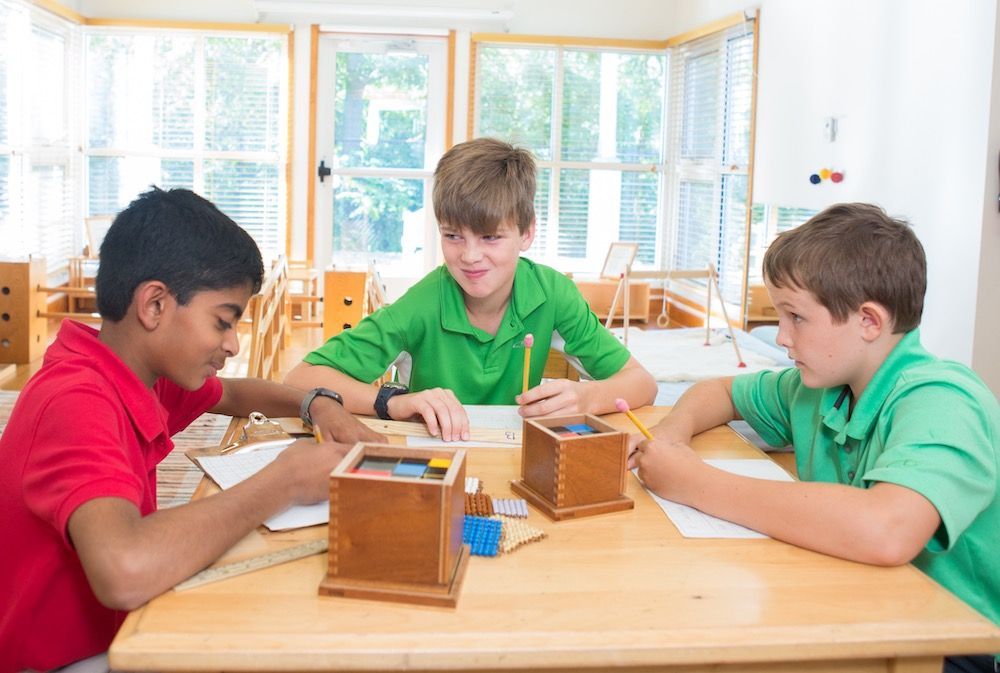
A Montessori education is a unique gift that parents are able to give their children. If you are at our school, you have experienced what this beautiful environment is like for families. Recently, a family with four children who have experienced many different schools over the last decade joined our school. Their mother wrote a moving letter about what the transition to Forest Bluff has done for each of their children. It was a meaningful message that inspired the teachers, founders, and administration, and we share it with you here.
Dear Forest Bluff School teachers, founders, and administration,
I wanted to write to thank you for the overflowing Blessings you have given our family.
Traditional School versus Forest Bluff School: Same tree, different soil.
It matters to God what we do with this life.
In our family we can trust our children to God and know our role as parents will change alongside them over time. A dinner table question we ask regularly is: “Was there a moment today when you felt like you were the best version of yourself?” One challenge that has come up is: How can we ask our children to be their best selves when the schools they attend do not know how to offer an environment that inspires them to find that version?
As a military spouse, moving is a frequent part of our lives. As a Montessori guide, I continue to learn how important the prepared environment is, and we work to create a homebase that accommodates and inspires our changing needs. As parents with young children, we have been able to control what is essential inside the home. I spend a great deal of prayer time thinking about landscape. Landscape is different from a prepared environment. It is something we encounter rather than create. Landscape includes the past, the present, and the future. We have been blessed to have four healthy and joyful children, but often the landscape makes the planting and growing season extremely difficult.
The analogy I keep visualizing on our journey is: same tree, different soil. As we move about, we have encountered blessings in different ways from the world around us, but the schools consistently fall short with providing the essential minerals for each of us. Paula Lillard wrote: “The key to all this positive self-formation is the establishment of the proper surroundings.” We have long awaited to find a school that not only saw our children with the dignity that we saw in them, but also allowed our family to learn and grow alongside them. Same tree, better soil.
The greatest gift of attending Forest Bluff School is the invitation to dive deep into a fertile soil that knows the essential needs of the living things who encounter it. It helps close the gap between how you are acting and who you want to be. Paula Lillard also wrote, “When we learn to observe and recognize these powers within children, we gradually begin to see the many ways that we inadvertently put obstacles in the way of their full development into a mature child by age twelve and a mature young adult by age eighteen. It is the prolonged work and concentration, freely chosen by the children and thereby reflecting their innate interests, that produces this transformation in personality and behavior.”
I observe that Forest Bluff raises intellectual virtues ahead of skills and knowledge.
Our oldest came home from the first day of school and shouted, “It feels like I am on summer vacation because I can finally work!”
In the FBS landscape children have “freed up the energy within them to explore and discover the world around them” (Paula Lillard and Angeline Lillard).
This allows the children to enter a state of flow. It looks like the children are on a spiritual retreat. I am witnessing these phenomena firsthand on school grounds.
E.M. Standing wrote, in the introduction to the Child in the Church: “I believe that God gave me this method in order to advance the kingdom of God.” I can see this in our community. I can see this in the FBS soil. We can all be like this, given the right environment.
There are hardly words to thank you for inviting us to experience this landscape. It is making a difference in our inner and outer work. John O’Donohue discusses “The Inner Landscape of Beauty.” He shares that landscapes awaken each of us and act like a “huge wild invitation to extend your imagination.” Our experience for the last four months at FBS has felt like this kind of awakening. I want to give examples of how FBS has helped change each of our children in the past months.
Our Oldest Daughter
Before Forest Bluff School:
Since birth, our oldest has been a brave, sensitive, and fiercely independent child. Raised with a “Montessori Mindset,” she was accustomed to living in a prepared environment, but she struggled with the culture of schools we enrolled her in on our journey. The main challenges she faced were a rigid environment and adults who focused on her weaknesses while discouraging her strengths. Constant testing put her on edge, raised her anxiety around learning, and placed her in competition with her peers. Her strengths, such as independence and cooperative/group learning, were discouraged by the factory model and empty vessel system of traditional education. If you asked her what she was studying or what book she was reading, she would say, “I don’t know.” Reading has been challenging for her and as time went on, we found her unable to enjoy reading because every ounce of her energy was being used to tackle 2-hours of adult-dependent homework (often on screens). By 11-years-old, our daughter was a ball of stress that could only find “flow” at home with the family.
At Forest Bluff School:
Within the first day of joining the Upper Elementary classroom, a weight was lifted and our daughter appeared lighter in heart and mind. She kept asking me if she was working hard enough because the stress had melted away. She was free to move, choose, and dive deep into her interests. Within weeks she was waking up and announcing the work she wanted to accomplish during the day and finding space to do chores that far exceeded our family’s expectations. For the first time since we could remember, she had available energy. The 60-minute independent reading requirement at FBS was new to her. In many ways, she didn’t know what to read and how to begin. Then the most amazing thing happened, there was enough time and space in her day to escape into the world of stories. She has always been the first to story time at our daily family read-aloud but she has never gotten “lost” in a book on her own. Within one month she was setting personal records of reading 100 pages in a day! This love affair is one that has to be found. FBS gave our daughter permission to make time to fall in love with reading.
Our Oldest Son
Before FBS:
Things have always come easily for our oldest son—walking, reading, and general problem-solving. Watching him develop has reminded me of a lecture I attended called “Good at Doing Things: Montessori Education and Higher Order Cognitive Functions” by Dr. Steven J. Hughes. He was just good at doing things. He was soaking up the Montessori home and all the activities like a little “model” on the Montessori Psycho/Motor Timeline Chart. We decided to homeschool him because of our military lifestyle, the pandemic, and financial challenges. When we arrived in Illinois he started at a local conventional school. It was fascinating to watch him move from a Montessori learning environment to chrome books, spelling tests, and a “busy” day without solid concentration. He went from creating timelines and maps that thrilled him to being required to use a math website called Freckle. Freckle is an online program that placed him in direct competition with his classmates and moved the focus from learning mathematical concepts to winning and being first in his class. He cared more about his external development than his internal one. It was a paradigm shift that was changing his priorities and focus from self-formation to conforming to an educational model that doesn’t encourage critical thinking.
At FBS:
Our son explained his transition to FBS as “freedom to work.” He announced how awesome it was to finally get the time and space to learn. One aspect of child development that challenges him is his desire to “go with the flow.” Now that he is at the age of Moral Formation, surrounding him with positive adults, peers, and a learning environment will help prepare the soil for healthy growth. He finds joy in the work at FBS, and our family appreciates the environment to inspire and nurture our virtuous boy into a well-rounded young man.
Our Younger Daughter
Before FBS:
Our younger daughter’s first experience in a school setting was her first-grade year at a local conventional school. For the first 6 years of her life she loved our Montessori homeschool. By the time she arrived in Illinois we were living in her 7th house, and adaptability was part of her character. She adapted to the surroundings beautifully at her new school. Unfortunately, it was obvious that she was becoming accustomed to a new set of priorities and expectations that were different from our home. She was given a punch card to get up to two punches per day for “good behavior” and she spent most of her day doing worksheets. She prided herself on her daily accomplishments of two punches and 100% on all her spelling tests. While she was seemingly thriving, it was clear to see that her “accomplishments” were based solely on extrinsic rewards that celebrated her obedience to authority and rules, rather than creativity or critical thinking. This excitement soon fell short when she was home sick. Her teacher sent home 21 pages of worksheets for missing one day of school. It became crystal clear that her days were spent churning out busy work, without any freedom to follow her interests.
At FBS:
Arriving at Forest Bluff was like a homecoming for our younger daughter. She felt free to explore, concentrate, move, and find meaningful work. She began to feel seen as an individual with unique gifts, interests, and endless creativity. It was a true homecoming for her. Her dignity was restored and her passion for learning was reawakened.
Our Youngest Son
Before FBS:
Our younger son is the youngest in our family. I have read that there are eight common characteristics of the youngest children:
- Attention Seeking.
- Manipulative.
- Spoiled.
- The “Family Pet”
- Rule-Challengers.
- Affectionate & Charming.
- Easygoing and Carefree.
- Persistent.
Our son was 3 years old when we arrived in Illinois, and he was on his way to being a poster child for a typical baby of the family. When he began in a conventional school for the first time, it felt great to know that he was able to head into a classroom and be kind to others. We were thrilled that he was able to cooperate with societal norms despite his spoiled nature at home. It was exciting to see him leave the nest and do good things in community. As the year progressed, my Montessori heart saw he was regressing in his ability to think on his own and explore his interests. He was bringing work home that looked like adult crafts, and much of his day was playing “make believe.” We made a routine when I picked him up: we would go to a nature preserve and then head home for “school.” We researched, practiced sounds, and explored the world around us. He was hungry for all of it. All was well, but the three hours of preschool was clearly daycare.
At FBS:
Our younger son felt like a gamble when it came to our transition, but he courageously accepted the midyear change. It was hard to imagine him giving up the “good life” of goldfish, lollipops, and dress-up. I wasn’t sure how much he would allow himself to enjoy FBS if he was so used to adults doing most of the heavy lifting for him. It took one week for him to understand the thrill of hard work. He saw that FBS had an environment that was made with the precision to meet each need or interest of his. He was blown away by the kindness of his guides and the design of his new surroundings. He had found the school he didn’t realize he needed to help recenter his greatest gifts. Soon he was coming home as if he had been at a retreat rather than a birthday party. He found his new favorite place.
Thank You
I want to thank you and your school from the bottom of our hearts for changing the trajectory of our lives. We are merely pilgrims on this journey here. It often feels that we can never be the people we are supposed to be when we move around so often. We find ourselves in places that are not home, but we must find belonging. There was a lecture at the AMI refresher course in 2021 titled, “Becoming and Belonging.” As we are becoming and belonging, your family and school have offered us a well-lit path, and we can never truly articulate the depth of this gift. We can promise you that we will cherish it and use the experience with gratitude throughout our days. Dorothy Day encouraged us, “to make the kind of society where it is easier to be good.” You are doing just this. I now look at our family at Forest Bluff and trust we are on a well-lit path. I hear the words of St. Catherine of Siena, “Be who God meant you to be and you will set the world on fire.” Thank you for inviting us into your landscape.
With Love, Light, and Gratitude,
Our Family


